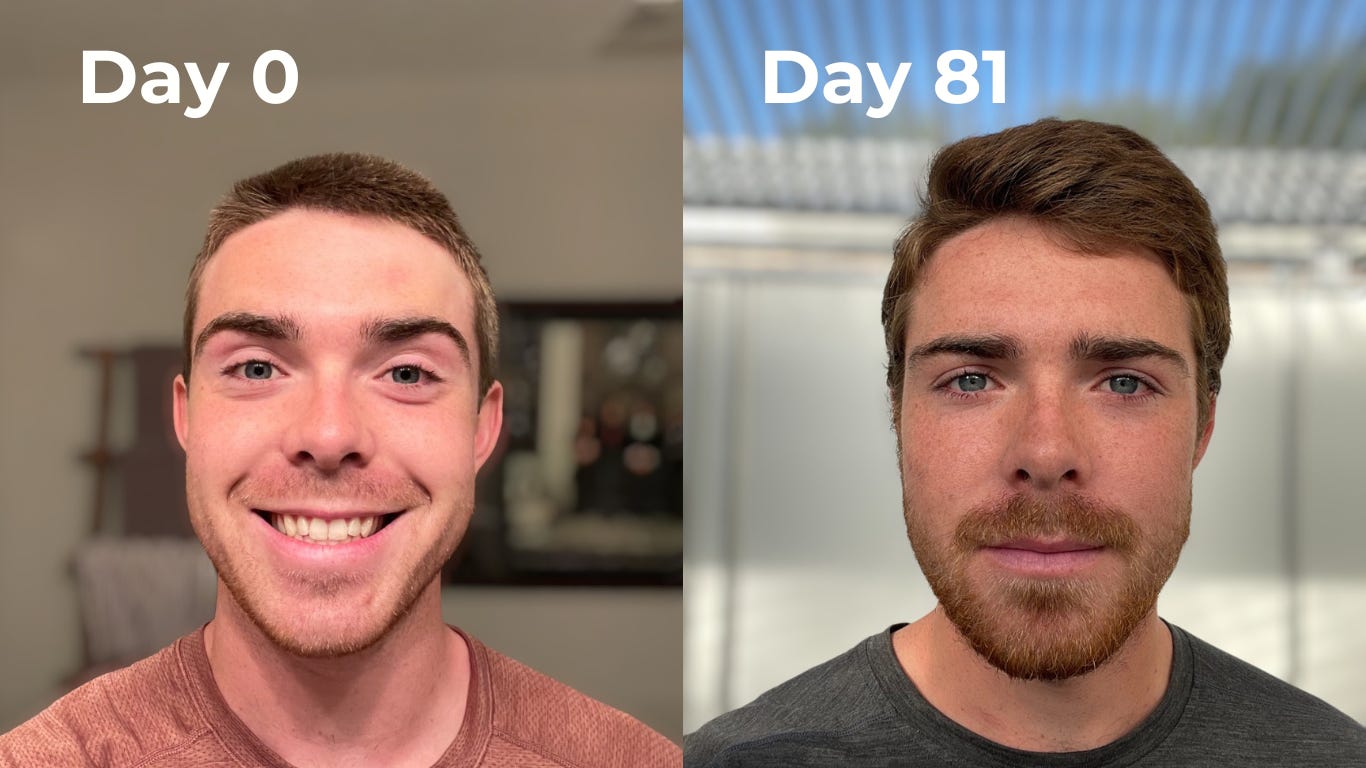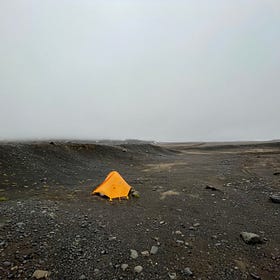Iceland, known to its people as "The Land of Fire and Ice," is Mother Nature's mouth; no place on Earth is more expressive. The island confronts you with extremes and teaches you to find harmony among them. In Iceland, you feel fire and ice.
Day 0
During the week after graduation, I moved out of my dorm in Hoboken, drove home to Kansas City, picked up a few last-minute items from the Overland Park REI, got a buzz-cut, received well-wishes from my family, then flew back to New Jersey for a half-day layover. Within the few hours I had in Hoboken, I had a send-off meal at Napoli's with my girlfriend, Taylor, and applied for a job as a content writer at my alma mater (which was the only job prospect I had pursued and the only one I was excited about, though at that time it was still equally likely that I would use my quantitive finance degree and start my career in management consulting). The next morning, I landed in Reykjavik, on Day 0 of the summer I spent backpacking solo in Iceland: June 1, 2022.
I had camped and hiked before, but I'd never backpacked. I had bought a full stock of gear, mostly online, with some items procured from the REI in SoHo, but I hadn't tested it. I was busy finishing my degree and graduating. I didn't even know if my 60-liter backpack would fit me correctly. But this trip wasn't about backpacking. I wasn't looking for a place to camp and hike for the summer. Backpacking was merely a means to get back to Iceland.
I had been to Iceland once before, for ten days during the summer before college, and I fell in love with the country. Before I had left, I knew I would come back. My goal was simply to return to Iceland and stay there as long as my savings and my tourist visa would allow. Since Iceland is one of the most expensive countries in the world to visit, the only way I could afford to be there for the whole summer without an income was to sleep outside on the ground. It meant that I had to learn how to backpack.
The Land of Fire and Ice is so named for its extreme climate. Winters boast the Norther Lights, but the conditions are often so severe that you're trapped indoors. That said, Iceland's summer is suitable doable for a first-time backpacker. It's not dangerously cold. There's no darkness, no bears, no crime. The only thing you have to worry about are sideways storms and jet-stream winds — oh! and making sure you don't starve or twist an ankle while you're hiking alone in the highlands or fall into a crevasse while you're on top of a glacier. Those risks, of course, I didn't consider in the planning phase. I know now that what kept me calm and resolute was a healthy sense of hubris, with a dash of ignorance.
I hadn't tested my gear, but I was otherwise prepared. I had spent months drawing a route through the nation's many campsites, researching each region, and marking everywhere I wanted to go (neglecting some computer science assignments to do it). I learned all about outdoor gear and created a budget for the summer, estimating my weekly expenses by the cost of food at Bónus and the average price of a one-night stay at a campsite. I figured out how much my pack should weigh and made a spreadsheet that tracked the weight of each item I bought online. When I finally had all my gear together in Kansas City, the night before my early-morning flight back to New Jersey, I packed my backpack for the first time. Before I placed it on the bathroom scale, I told my mom, "If this is under 22 pounds, we're golden." The scale read "21.0."
Here's excerpt from my first journal entry of the summer, written on June 1 during my flight from Newark to Reykjavik:
I have no expectations for this trip, only expectations of myself. I expect myself to be safe and cautious, to write and read every day, to present myself to others and initiate interactions, and to prioritize stillness and presence above all else for the next three months.
Successfully planning and executing this trip is the greatest accomplishment of my life. And I attribute the trip's success to that mindset, to that clarity of purpose.
Day 81
For 81 days, I hiked and camped around the island-nation in the heart of the world. I was traveling solo, and everything I needed to live was strapped to my back, which meant I could go wherever I wanted and stay as long as I liked. I saw lava fields and fjords, roaming sheep and arctic foxes, waterfalls and black-sand beaches, glaciers and volcanoes. I had two pairs of underwear, showered twice per week, and did laundry twice per month. My days were filled with walking, reading, writing, cooking, and talking to strangers. It was the most free and grounded, the most human, I've ever felt.
The abundance of solitude and silence stirred up all kinds of ideas. Early on, I found a framework that helped me categorize my thinking and make sense of my experience. Partly inspired by "The Land of Fire and Ice," partly inspired by Milan Kundera's The Unbearable Lightness of Being, the framework was to think of everything as part of a duality: the duality of the light and heavy.
It's one of those true paradoxes at the heart of the human experience, like how Iceland is The Land of Fire and Ice, not The Land of Ice (as its actual name would suggest) or The Land of Fire. It is both — not a dichotomy but a duality. We humans exist at the intersection of the light and heavy. We are free to act, yet in any moment we may be reminded of the futility of our actions in evading our inevitable fate: death.
Lightness is freedom and opportunity; heaviness is fate and commitment. Both are necessary, and either alone is ruinous. Lightness is like fire: brilliant, chaotic, mesmerizing, destructive, life-giving. Heaviness is like ice: structured, solid, slippery, boring, reliable.
Nothing that is true sits on one side of a dichotomy: black or white, light or heavy, fire or ice. Everything that is true is some gradient within a duality: fire and ice, light and heavy, gray. I understood this lesson as soon as I started backpacking. My pack, like life, was both light and heavy. It was a source of unprecedented freedom that allowed me to go wherever I pleased. Yet, it was a heavy burden that I had to carry wherever I went.
Here's an excerpt from my August 21 journal entry, on day 81 of my summer in The Land of Fire and Ice:
I had a metamorphosis-moment last night, beneath the church and the goddess Aurora, who was wearing a green, slit-leg, silk, flowy dress. It was my moment of metamorphosis because it was the first time I knew that I would be able to bring this trip home, that I had already integrated part of it into my being. That part is stillness. It is a stillness borne from gratitude and guided by my intentions. It is a stillness that regards existence as inherently good and permits me to indulge in the pleasures of experience. It is a stillness that makes all things pleasurable because it connects me with Nature by bringing my awareness to the present moment. That is what I will take home — that sort of stillness.
Iceland taught me how to find harmony among the light and heavy. I learned to live within the duality, rather than betraying truth and deluding myself into choosing one side of a false dichotomy. Iceland taught me how to feel fire and ice.
I spent the summer of 2022 hiking and camping around Iceland, and it's taken a year of reflecting on my experience to understand what I learned and to know how to make it legible (literally) to others. I now know how to communicate my experience, or at least, I'm ready to give it my best shot.
This is the prologue to a five-chapter series chronicling my summer in Iceland and what I learned from each leg of the trip. Each chapter explores its own duality, and resolves in a lesson about how to find harmony among two extremes. In a way, each chapter is about feeling fire and ice, hence the title of this prologue and this series.
With these essays, I hope to share some of the wisdom that was imparted to me by the voice of Mother Nature on this small island-nation in the heart of the world. Thank you for reading.
Springboard
A carefully crafted question to help you dive inwards:
What is the greatest accomplishment of your life? Did it change your trajectory or simply give you permission to continue down the path you were on already?
Hubris & Humility
There's nothing more humbling then realizing you don't know how to shit. Am I a fully functioning adult capable of navigating the Icelandic wilderness? Or am I merely a waddling toddler who needs to be told where to place his doo-doo?
Contents: "Feeling Fire & Ice"
I. Hubris & Humility
Akranes to Thingvellir – A first-time backpacker's blunders
II. Majesty & Mortality
Vatnaleið to Hellissandur – Beneath an ancient glacier, grappling with my cosmic insignificance
III. Neuroticism & Naïveté
Hellissandur to Brjánslækur – What I learned from getting robbed in Iceland
IV. Solitude & Company
Isafjörður to Veiðileysufjörður – Alone in the most remote region of Iceland
V. Stillness & Ambition
Borgarfjörður to Seyðisfjörður – I needed to sleep so that I could dream. I needed to dream so that, later, I could achieve.







“Lightness is freedom and opportunity; heaviness is fate and commitment. Both are necessary, and either alone is ruinous.”
This was a fantastic essay but this line especially hits for me. As a young traveller trying to figure out life, I’m constantly trying to find the right balance of lightness and heaviness as you describe them here.
Creating a life in which you have the right balance of each, I believe, is necessary for a full and happy life.
In reponse to your spring board question:
When I finished writing my first book in college, I realized two things.
First, what feels impossibly daunting can be done if you’re patient
Second, nothing will ever satisfy me more than writing
Both those realizations changed my life, and continue to do so